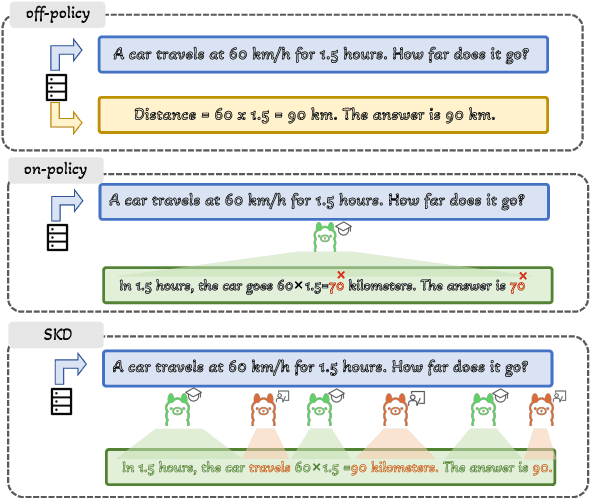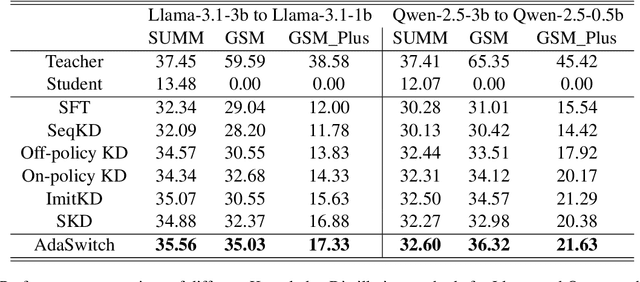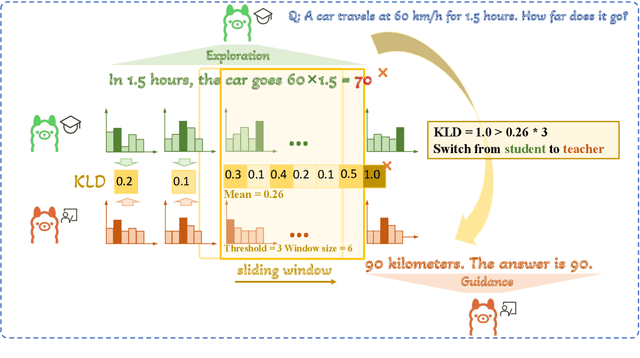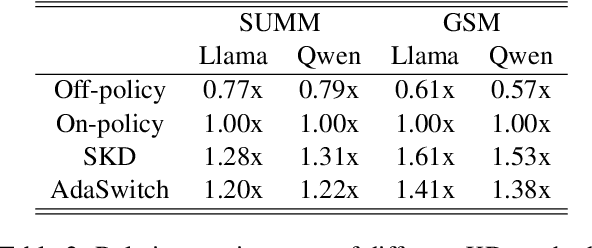Maolin Wang
Victor
To Search or Not to Search: Aligning the Decision Boundary of Deep Search Agents via Causal Intervention
Feb 03, 2026Abstract:Deep search agents, which autonomously iterate through multi-turn web-based reasoning, represent a promising paradigm for complex information-seeking tasks. However, current agents suffer from critical inefficiency: they conduct excessive searches as they cannot accurately judge when to stop searching and start answering. This stems from outcome-centric training that prioritize final results over the search process itself. We identify the root cause as misaligned decision boundaries, the threshold determining when accumulated information suffices to answer. This causes over-search (redundant searching despite sufficient knowledge) and under-search (premature termination yielding incorrect answers). To address these errors, we propose a comprehensive framework comprising two key components. First, we introduce causal intervention-based diagnosis that identifies boundary errors by comparing factual and counterfactual trajectories at each decision point. Second, we develop Decision Boundary Alignment for Deep Search agents (DAS), which constructs preference datasets from causal feedback and aligns policies via preference optimization. Experiments on public datasets demonstrate that decision boundary errors are pervasive across state-of-the-art agents. Our DAS method effectively calibrates these boundaries, mitigating both over-search and under-search to achieve substantial gains in accuracy and efficiency. Our code and data are publicly available at: https://github.com/Applied-Machine-Learning-Lab/WWW2026_DAS.
Exploring Recommender System Evaluation: A Multi-Modal User Agent Framework for A/B Testing
Jan 08, 2026Abstract:In recommender systems, online A/B testing is a crucial method for evaluating the performance of different models. However, conducting online A/B testing often presents significant challenges, including substantial economic costs, user experience degradation, and considerable time requirements. With the Large Language Models' powerful capacity, LLM-based agent shows great potential to replace traditional online A/B testing. Nonetheless, current agents fail to simulate the perception process and interaction patterns, due to the lack of real environments and visual perception capability. To address these challenges, we introduce a multi-modal user agent for A/B testing (A/B Agent). Specifically, we construct a recommendation sandbox environment for A/B testing, enabling multimodal and multi-page interactions that align with real user behavior on online platforms. The designed agent leverages multimodal information perception, fine-grained user preferences, and integrates profiles, action memory retrieval, and a fatigue system to simulate complex human decision-making. We validated the potential of the agent as an alternative to traditional A/B testing from three perspectives: model, data, and features. Furthermore, we found that the data generated by A/B Agent can effectively enhance the capabilities of recommendation models. Our code is publicly available at https://github.com/Applied-Machine-Learning-Lab/ABAgent.
From Failure to Mastery: Generating Hard Samples for Tool-use Agents
Jan 04, 2026Abstract:The advancement of LLM agents with tool-use capabilities requires diverse and complex training corpora. Existing data generation methods, which predominantly follow a paradigm of random sampling and shallow generation, often yield simple and homogeneous trajectories that fail to capture complex, implicit logical dependencies. To bridge this gap, we introduce HardGen, an automatic agentic pipeline designed to generate hard tool-use training samples with verifiable reasoning. Firstly, HardGen establishes a dynamic API Graph built upon agent failure cases, from which it samples to synthesize hard traces. Secondly, these traces serve as conditional priors to guide the instantiation of modular, abstract advanced tools, which are subsequently leveraged to formulate hard queries. Finally, the advanced tools and hard queries enable the generation of verifiable complex Chain-of-Thought (CoT), with a closed-loop evaluation feedback steering the continuous refinement of the process. Extensive evaluations demonstrate that a 4B parameter model trained with our curated dataset achieves superior performance compared to several leading open-source and closed-source competitors (e.g., GPT-5.2, Gemini-3-Pro and Claude-Opus-4.5). Our code, models, and dataset will be open-sourced to facilitate future research.
Renormalization Group Guided Tensor Network Structure Search
Dec 31, 2025Abstract:Tensor network structure search (TN-SS) aims to automatically discover optimal network topologies and rank configurations for efficient tensor decomposition in high-dimensional data representation. Despite recent advances, existing TN-SS methods face significant limitations in computational tractability, structure adaptivity, and optimization robustness across diverse tensor characteristics. They struggle with three key challenges: single-scale optimization missing multi-scale structures, discrete search spaces hindering smooth structure evolution, and separated structure-parameter optimization causing computational inefficiency. We propose RGTN (Renormalization Group guided Tensor Network search), a physics-inspired framework transforming TN-SS via multi-scale renormalization group flows. Unlike fixed-scale discrete search methods, RGTN uses dynamic scale-transformation for continuous structure evolution across resolutions. Its core innovation includes learnable edge gates for optimization-stage topology modification and intelligent proposals based on physical quantities like node tension measuring local stress and edge information flow quantifying connectivity importance. Starting from low-complexity coarse scales and refining to finer ones, RGTN finds compact structures while escaping local minima via scale-induced perturbations. Extensive experiments on light field data, high-order synthetic tensors, and video completion tasks show RGTN achieves state-of-the-art compression ratios and runs 4-600$\times$ faster than existing methods, validating the effectiveness of our physics-inspired approach.
AdaSwitch: Adaptive Switching Generation for Knowledge Distillation
Oct 09, 2025



Abstract:Small language models (SLMs) are crucial for applications with strict latency and computational constraints, yet achieving high performance remains challenging. Knowledge distillation (KD) can transfer capabilities from large teacher models, but existing methods involve trade-offs: off-policy distillation provides high-quality supervision but introduces a training-inference mismatch, while on-policy approaches maintain consistency but rely on low-quality student outputs. To address these issues, we propose AdaSwitch, a novel approach that dynamically combines on-policy and off-policy generation at the token level. AdaSwitch allows the student to first explore its own predictions and then selectively integrate teacher guidance based on real-time quality assessment. This approach simultaneously preserves consistency and maintains supervision quality. Experiments on three datasets with two teacher-student LLM pairs demonstrate that AdaSwitch consistently improves accuracy, offering a practical and effective method for distilling SLMs with acceptable additional overhead.
Empowering Denoising Sequential Recommendation with Large Language Model Embeddings
Oct 05, 2025Abstract:Sequential recommendation aims to capture user preferences by modeling sequential patterns in user-item interactions. However, these models are often influenced by noise such as accidental interactions, leading to suboptimal performance. Therefore, to reduce the effect of noise, some works propose explicitly identifying and removing noisy items. However, we find that simply relying on collaborative information may result in an over-denoising problem, especially for cold items. To overcome these limitations, we propose a novel framework: Interest Alignment for Denoising Sequential Recommendation (IADSR) which integrates both collaborative and semantic information. Specifically, IADSR is comprised of two stages: in the first stage, we obtain the collaborative and semantic embeddings of each item from a traditional sequential recommendation model and an LLM, respectively. In the second stage, we align the collaborative and semantic embeddings and then identify noise in the interaction sequence based on long-term and short-term interests captured in the collaborative and semantic modalities. Our extensive experiments on four public datasets validate the effectiveness of the proposed framework and its compatibility with different sequential recommendation systems.
Exploring Superior Function Calls via Reinforcement Learning
Aug 07, 2025Abstract:Function calling capabilities are crucial for deploying Large Language Models in real-world applications, yet current training approaches fail to develop robust reasoning strategies. Supervised fine-tuning produces models that rely on superficial pattern matching, while standard reinforcement learning methods struggle with the complex action space of structured function calls. We present a novel reinforcement learning framework designed to enhance group relative policy optimization through strategic entropy based exploration specifically tailored for function calling tasks. Our approach addresses three critical challenges in function calling: insufficient exploration during policy learning, lack of structured reasoning in chain-of-thought generation, and inadequate verification of parameter extraction. Our two-stage data preparation pipeline ensures high-quality training samples through iterative LLM evaluation and abstract syntax tree validation. Extensive experiments on the Berkeley Function Calling Leaderboard demonstrate that this framework achieves state-of-the-art performance among open-source models with 86.02\% overall accuracy, outperforming standard GRPO by up to 6\% on complex multi-function scenarios. Notably, our method shows particularly strong improvements on code-pretrained models, suggesting that structured language generation capabilities provide an advantageous starting point for reinforcement learning in function calling tasks. We will release all the code, models and dataset to benefit the community.
FunReason: Enhancing Large Language Models' Function Calling via Self-Refinement Multiscale Loss and Automated Data Refinement
May 26, 2025



Abstract:The integration of large language models (LLMs) with function calling has emerged as a crucial capability for enhancing their practical utility in real-world applications. However, effectively combining reasoning processes with accurate function execution remains a significant challenge. Traditional training approaches often struggle to balance the detailed reasoning steps with the precision of function calls, leading to suboptimal performance. To address these limitations, we introduce FunReason, a novel framework that enhances LLMs' function calling capabilities through an automated data refinement strategy and a Self-Refinement Multiscale Loss (SRML) approach. FunReason leverages LLMs' natural reasoning abilities to generate high-quality training examples, focusing on query parseability, reasoning coherence, and function call precision. The SRML approach dynamically balances the contribution of reasoning processes and function call accuracy during training, addressing the inherent trade-off between these two critical aspects. FunReason achieves performance comparable to GPT-4o while effectively mitigating catastrophic forgetting during fine-tuning. FunReason provides a comprehensive solution for enhancing LLMs' function calling capabilities by introducing a balanced training methodology and a data refinement pipeline. For code and dataset, please refer to our repository at GitHub https://github.com/BingguangHao/FunReason
Measure Domain's Gap: A Similar Domain Selection Principle for Multi-Domain Recommendation
May 26, 2025Abstract:Multi-Domain Recommendation (MDR) achieves the desirable recommendation performance by effectively utilizing the transfer information across different domains. Despite the great success, most existing MDR methods adopt a single structure to transfer complex domain-shared knowledge. However, the beneficial transferring information should vary across different domains. When there is knowledge conflict between domains or a domain is of poor quality, unselectively leveraging information from all domains will lead to a serious Negative Transfer Problem (NTP). Therefore, how to effectively model the complex transfer relationships between domains to avoid NTP is still a direction worth exploring. To address these issues, we propose a simple and dynamic Similar Domain Selection Principle (SDSP) for multi-domain recommendation in this paper. SDSP presents the initial exploration of selecting suitable domain knowledge for each domain to alleviate NTP. Specifically, we propose a novel prototype-based domain distance measure to effectively model the complexity relationship between domains. Thereafter, the proposed SDSP can dynamically find similar domains for each domain based on the supervised signals of the domain metrics and the unsupervised distance measure from the learned domain prototype. We emphasize that SDSP is a lightweight method that can be incorporated with existing MDR methods for better performance while not introducing excessive time overheads. To the best of our knowledge, it is the first solution that can explicitly measure domain-level gaps and dynamically select appropriate domains in the MDR field. Extensive experiments on three datasets demonstrate the effectiveness of our proposed method.
Align-GRAG: Reasoning-Guided Dual Alignment for Graph Retrieval-Augmented Generation
May 22, 2025Abstract:Large language models (LLMs) have demonstrated remarkable capabilities, but still struggle with issues like hallucinations and outdated information. Retrieval-augmented generation (RAG) addresses these issues by grounding LLM outputs in external knowledge with an Information Retrieval (IR) system. Building on this foundation, graph-based RAG systems go a step further by retrieving subgraphs, which preserve the relationships between knowledge entities and provide more comprehensive context. However, graph RAG faces two challenges: (1) Retrieving relevant information introduces irrelevant nodes (especially in dense graph databases, where retrieval usually extends to adjacent nodes), and leads to overly lengthy inputs that hinder efficiency; (2) The representation gap between graph and language during generation with LLMs limits the ability to fully leverage graph structures for enhanced understanding. To address these limitations, we propose Align-GRAG, a novel reasoning-guided dual alignment framework in post-retrieval phrase. It first formulates a subgraph by retrieving nodes and edges. Then an Aligner is proposed to jointly optimizes a graph encoder with LLM-summarized reasoning. It achieves dual alignment of graph node and representation by leveraging KL divergence loss and contrastive loss, facilitating efficient pruning of irrelevant knowledge and establishing a unified semantic space. The Generator integrates the aligned graph data with LLM to produce coherent and accurate answers. Experiments on GraphQA benchmark across three tasks (including common sense reasoning, scene graph understanding, and knowledge graph reasoning) validate the effectiveness of our method. The code will be available upon accepted.
 Add to Chrome
Add to Chrome Add to Firefox
Add to Firefox Add to Edge
Add to Edge